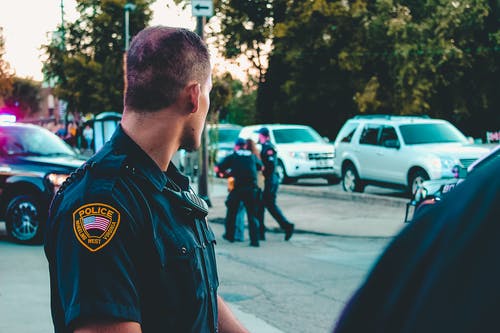One final tip: If you are able to return home and access your smartphone, do not post on social media. Anything you share can be used against you in court.
If you have committed a crime in Colorado, or you are suspected of doing so, you could be arrested. The police need probable cause that you committed a crime to arrest you, such as witnessing you commit a crime. If they didn’t witness the crime, they need enough probable cause, or they need to go to a judge and get a warrant.
In addition to being arrested, Colorado police can detain you if they have reasonable suspicion that you committed a crime. If you have been detained or pulled over, you are legally required to show your ID when asked.
The Arrest
Many people are caught off guard when they get arrested. It can happen anywhere – at your home, during a traffic stop, or out in public. Never fight the arrest, even if you are being wrongly accused. You can fight the charge later, and you don’t want the added charge of resisting arrest. Remain respectful and quiet. The arresting officer is not a judge, so they don’t care whether you are guilty, and they have no power to reverse your charges.
Your Rights
While getting arrested, the police will read you the Miranda rights and ask if you understand them. You have probably heard these rights on TV or in movies before:
- You have the right to remain silent
- Anything you say can and will be used against you in a court of law
- You have the right to an attorney. If you cannot afford a lawyer, one will be provided for you.
Once you say “yes” to understanding your rights, you should not answer any questions from the police. Any answers you provide can and likely will be used against you later in court. Instead, say things like “I choose to remain silent” or “I want to speak to a lawyer.” The police also need to notify you of why you are being arrested.
Booking & Bail

Next is the booking process. Once at the police station, you will be fingerprinted, have your mugshot taken, and be searched. If you have been arrested in a different jurisdiction, they will turn you over to the correct jurisdiction.
After booking, the police will post a bail bond, which is the amount of money it will cost you to be released. Being released won’t erase your charges of course, but if you can afford bail, you will be allowed to await trial at home instead of in prison. According to Colorado criminal defense attorneys Anaya & Chadderdon, the bail price needs to be reasonable so as not to violate the eighth amendment right against excessive bail. A lawyer can help you reduce an unreasonable bail amount.
If you were arrested for a DUI, the police have a few options. After they give you summons, meaning the paperwork with information about your charges and court date, they can release you to a sober party. Alternatively they can book you in jail with a bond, or bring you to a detox facility to sober up.
Lawyer Up
No matter where you are awaiting trial, your final step is to call a criminal defense lawyer. Having a legal expert on your side is crucial to fighting your charges. As stated in your rights, if you cannot afford an attorney you will be provided with one. Your lawyer can handle the process from here.
One final tip: If you are able to return home and access your smartphone, do not post on social media. Anything you share can be used against you in court.


Join the conversation!